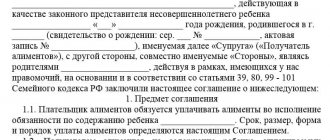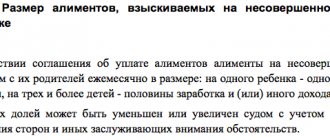Last modified: January 2020
When a father does not fulfill his duties towards a minor, there is a way to deprive the father of paternity, correlating the circumstances with the provisions of family law. The procedure for terminating paternity depends on the presence of the father’s consent, taking into account the grounds established by Article 69 of the RF IC.
Deprivation of paternity does not mean release from responsibilities to the child. By limiting the rights of a parent, the legislator provides for the preservation of all responsibilities.
What does the term “deprivation of paternity” mean?
The father receives equal rights with the mother in relations with the child from the moment his data is entered in the birth record of the baby. The list of such rights is indicated in Chapter. 12 of the RF IC, among them the right to:
- communication with a minor;
- upbringing;
- participation in material support and training;
- some property rights, including the right to inherit in the event of the death of a child, the right to collect alimony from an able-bodied son or daughter, the right to receive various social pensions and benefits.
Deprivation of parental rights automatically cancels all of the above rights of parents, while simultaneously maintaining all the responsibilities of the father in relation to the minor. It is used as a last resort only in cases where other measures of influence, such as:
- long-term work with a dysfunctional parent by social services;
- restrictions on parental rights
had no result.
Deprivation of parental rights is possible only by court decision. At the same time, until the court decision comes into force, the father still remains vested with all of the above parental rights.
Please note: initiating the process of depriving paternity in a situation where he is in MLS is not allowed, except in cases where he was convicted of murder or causing serious harm to the health of the mother or another close relative of the baby, including his stepfather.
Legislation on deprivation of father's rights
When considering cases on deprivation of parental rights, the court is guided by articles of Russian legislation that define the rights and responsibilities of parents in relation to their minor children, and also indicate the reasons that are the basis for depriving them of the rights secured by kinship. This is first of all:
- Family Code of the Russian Federation (Articles 56, 63, 66, 69 – 71, 78);
- Civil Procedure Code of the Russian Federation (Articles 55,56).
These articles define how deprivation of paternity rights occurs unilaterally in Russia, the sequence of actions and procedure for carrying out the procedure for deprivation of paternity, as well as the consequences that follow.
In addition, the above-mentioned documents describe the rights of a child deprived of the rights of the father and his relatives after the court makes a positive decision to satisfy the claim. They also indicate the persons who can initiate the process of deprivation of paternity, determine the extent of participation and the role of the guardianship authorities in considering such cases.
In what cases is deprivation of paternity possible?
According to Art. 69 of the RF IC, deprivation of parental rights is possible on the following grounds:
- Refusal or evasion of material content . Basically, this is refusal or evasion of paying alimony without a good reason, occurring over a long period of time.
- Cruel treatment . The fact of ill-treatment must be confirmed by a court decision that has entered into force. The law includes: physical (causing harm to health, torture, beatings);
- mental;
- sexual violence.
- involvement in criminal activity;
Who can deprive
Most often, mothers have to initiate the procedure for deprivation of parental rights, who in this way try to influence persistent non-payers of child support.
This measure is necessary, since the father poses a real threat to the child.
In addition to the mother, the following have the right to file a claim:
- police officers, guardianship authorities;
- educator or teacher of a minor;
- other relatives;
- neighbors, etc.
The most important thing at this stage is to respect the interests of the child. Even if deprivation of the father’s parental rights will result in the minor being placed in the care of the state.
When to go to court regarding deprivation of parental rights
The mother does not always initiate deprivation of paternity; often she simply limits or completely excludes the child’s communication with the negligent father and leaves it at that. But there are situations when she is forced to go to court with a claim to deprive the biological father of parental rights. Among them:
- The need to take the child outside the Russian Federation. In such cases, the written consent of the second parent is required for the child to travel abroad, no matter - for a short time or for permanent residence abroad. Often fathers refuse to consent to the removal of the child, or demand a large financial reward from the mother for signing the document. If the baby’s mother proves that the biological father did not take any part in supporting the minor or harmed the child in some other way, the court will decide to deprive him of paternity.
- There are often cases when fathers, without taking any part in the life of a minor, after he has grown up and began to earn good money, file a claim against him for the award of alimony for his maintenance. Deprivation of paternity even before the minor has become able to work will help protect the child from material claims from the father in the future.
- Often, after a divorce from the father of their children, women start a family with another man who is ready not only to support minors, but also to adopt them. As a rule, the biological father opposes the formalization of the relationship between another man and his children, and he does not want to take any part in the maintenance of his son or daughter. In this case, the court will also decide to deprive him of paternity and change the child’s surname without the consent of the biological father.
What difficulties may arise?
The process of depriving a father of parental rights has its own difficulties, which have a basis. Losing parental authority is a serious step with far-reaching consequences. The court, when considering the issue of a specific family and the relationship between parent and ward, will be guided by the interests of the child. The plaintiff's demands will be satisfied subject to the provision of evidence, which is not so easy to collect.
In order for a child’s rights to be violated and the child’s representative intends to protect them, serious legal support will be required. It is recommended to use the help of lawyers when drawing up claims, as well as get advice on determining the position in court.
The RF IC has a limited list of grounds that can be used in court, but competent interpretation and preparation of evidence will help increase the chances of a successful claim.
Procedure for deprivation of paternity
So, we have found out that it is possible to deprive a father of parental rights. But deprivation of paternity occurs only in court. Let's look at where to start the procedure and what actions need to be taken.
Who can initiate the process
The following may file a claim for deprivation of paternity in court:
- mother of a minor;
- his legal representative: guardian, adoptive parents, head of the institution where the child is located;
- prosecutor's office;
- department of guardianship and trusteeship;
- commission on juvenile affairs.
At this point, the list of persons entitled to initiate the procedure for deprivation of paternity is completely exhausted. If a claim is filed by any other person or official not listed above, the court will not consider the claim.
Step-by-step instruction
The algorithm of actions of the process initiator is as follows:
- Preparing for the process.
- Collection of documents and evidence necessary for the court.
- Drawing up a statement of claim.
- Appeal to judicial authorities.
- Trial.
- Receipt of a court decision that has entered into force.
Preparation for the process
Before going to court, it is necessary to try to preserve the minor’s relationship with his father. Often, a conversation between an employee of the guardianship department and the child’s second parent can bring the latter “to his senses” when he realizes that he may lose his son or daughter forever. Such preventive actions are mandatory if the process of deprivation of paternity is initiated by the prosecutor's office or guardianship authorities. But the baby’s mother or his guardians (adoptive parents) can file a claim without a preliminary conversation with the defendant.
In order for the court to satisfy the claims, it is necessary to obtain strong evidence of the unlawful actions of the second parent. For example, if a man maliciously fails to fulfill his alimony obligations towards a child, it is necessary to prepare a certificate about the amount of debt for alimony payments.
Please note: such a measure as deprivation of paternity can only be applied to the biological father, the child’s relationship with whom is officially confirmed.
Collection of evidence
As evidence, the plaintiff may present any documents providing grounds for deprivation of paternity. It could be:
- a court verdict for child abuse that has entered into force;
- a verdict in a case of causing grave harm to a child, his mother, or other close relatives, or a verdict in a case of murder of the listed relatives of a minor;
- conviction for sexual assault of a child;
- resolution of the commission on minors' affairs or other authorized body on the involvement of a minor in drinking alcoholic beverages or using drugs;
- a court decision to limit paternity if the defendant in the case has not corrected his behavior (no earlier than 6 months after it was made).
In each situation, the list of documents presented to the court as evidence in the case may be different. You can contact a family lawyer who will tell you what documents you will need to collect in your particular case.
Preparing a claim
The statement of claim for deprivation of parental rights must contain the following information:
- the name of the court to which the claim is filed and its address;
- information about the applicant and the respondent;
- information about third parties involved in the process, usually the guardianship and trusteeship department, as well as a representative of the prosecutor’s office;
- title of the statement of claim: “Statement of Claim for Deprivation of Parental Rights”;
- information about the relationship of the defendant with the minor;
- the grounds on which the plaintiff demands to deprive the defendant of paternity;
- measures taken to preserve family ties;
- references to laws and regulations;
- claim;
- numbered list of attached documents;
- date and signature.
Sample statement of claim for deprivation of parental rights
Required documents
The following documents will need to be submitted to the court:
- Statement of claim. Several copies will be required according to the number of participants in the process, plus one copy for the court.
- Birth certificate of a minor. If the child is 14 years old, then a copy of his passport.
- Certificate of marriage or divorce. It is necessary to confirm the plaintiff’s status: whether she is married or divorced.
- If information about the father is not listed in the “father” column of the birth certificate, then a certificate of paternity will be required.
- An extract from the house register, or any other document confirming the place of registration of the minor.
- A copy of the plaintiff's passport.
- Receipt for payment of state duty.
- If the interests of the plaintiff in court will be represented by his authorized representative, then he will additionally need to submit a notarized copy of the power of attorney.
In addition to those listed above, you will need documents confirming the grounds for deprivation of parental rights. In each case they will be different.
If the father does not take part in the upbringing of the minor , then it will be necessary to additionally attach:
- Certificate from the educational institution the child attends. This could be a certificate from a school or kindergarten.
- Characteristics from the educational institution, which must contain information about who takes the main part in the upbringing of the minor.
- A certificate from a medical institution, based on which the court can make a conclusion about who bears the costs of treating a minor, brings him to see a doctor, for medical procedures, etc.
- Characteristics of any sections, clubs, institutions of additional education, which will contain information about who brings the child to classes and picks him up, whether the other parent takes part in this.
In addition to the listed certificates and characteristics, the plaintiff may attach testimony of witnesses, teachers, coaches, and medical personnel. It is important to keep in mind that these witnesses will be required to verbally corroborate their testimony at trial.
If the father does not take part in the financial support of the minor and does not pay alimony , then additional support will be required:
- Certificate from the defendant's place of work.
- Court decision to collect child support.
- A copy of the enforcement proceedings in the case of non-payment of alimony obligations.
If the defendant takes drugs or abuses alcohol , then you will need to provide:
- A certificate from the drug dispensary stating that he is registered.
- Certificate that it was encoded.
- A certificate from law enforcement agencies confirming the initiation of administrative or criminal proceedings against him.
- Information about deprivation of his right to drive a vehicle.
- Information about his completion of a rehabilitation course for drug addiction or after long-term drinking bouts.
- Any information about complaints to law enforcement or other authorities about the deviant behavior of the defendant.
If the defendant uses violence against a child or abuses parental rights , it will be necessary to add:
- Certificates from a medical institution or emergency room about harm to the health of a minor.
- Information that in order to resolve conflicts in the family it was necessary to call representatives of law enforcement agencies, guardianship and trusteeship officers.
- Information that the child was detained by law enforcement officers.
- Written testimony of doctors, teachers, and other witnesses.
If the defendant carried out criminal intent against a minor or his close relatives (including the mother’s new husband) , a copy of the court decision and the indictment will need to be attached to the statement of claim.
Appeal to court and trial
Jurisdiction must be respected. A claim for deprivation of parental rights is filed in the district or city court at the defendant’s place of residence. In those cases where, along with a demand for deprivation of paternity, a petition for the collection of alimony is filed, the claim may be sent to the court at the place of residence of the minor.
The presence of the applicant in court is mandatory. If he cannot attend court hearings on his own, he can entrust this to his legal representative, but only with a notarized power of attorney.
The plaintiff may bring as witnesses in the case:
- teachers;
- neighbors;
- relatives;
- representatives of the PLO;
- representatives of law enforcement agencies;
- other persons who can testify about the defendant’s improper performance of his parental responsibilities.
Restoration of rights
When one of the parents is deprived of their rights to children, the child cannot be adopted for the first 6 months. And the parent does not have the right to file a lawsuit to restore his rights. But after this period, the child may be adopted and then the father will no longer be able to restore his rights.
In order to achieve the return of parental rights, it is necessary:
- comply with all court orders;
- change your lifestyle;
- improve relationships with the child’s mother or guardians;
- attract the guardianship authorities to your side.
If the father really wants to restore his rights, he needs to adjust his lifestyle (for example, get rid of an alcohol or drug habit), find a job, improve his living conditions and help the child financially.
As soon as he is ready to prove that he can fully fulfill parental responsibilities, he must go to court. The procedure is standard and includes filing a claim, preparing documents and attending a meeting. The defendant should indicate the child or other relative who has custody of him.
As for evidence, you should prepare a salary certificate, a job description, documents confirming the payment of alimony debt. If the child's father had problems with alcohol or drug addiction, it is necessary to provide evidence of treatment.
Duration of the trial
If the plaintiff presents to the court a sufficient amount of irrefutable evidence of the defendant’s improper performance of parental responsibilities, then the court’s decision will be made at the first court hearing. In this case, the duration of the proceedings will be from two to three months (one to two months for the preparatory period and one month will pass after the court decision is made before it enters into legal force).
However, the trial may be delayed if:
- the defendant will be able to find witnesses or documentary evidence that there were no guilty actions on his part;
- the plaintiff did not provide irrefutable evidence of the defendant’s guilt;
- witnesses on behalf of the plaintiff ignored court hearings and did not appear in court;
- The defendant filed an appeal.
Expenses
When filing a statement of claim, the plaintiff must pay a state fee. Since the trial for deprivation of paternity is carried out to protect the rights of the child, the plaintiff is exempt from paying state fees.
But the plaintiff may incur other monetary costs, for example:
- Consulting a lawyer in family matters can cost from one to three (or more) thousand rubles.
- Drawing up a statement of claim will cost from one to three thousand rubles.
- Protecting the interests of the applicant in court will cost from five thousand rubles per court hearing.
Legal consequences
Termination of paternity has consequences for all parties involved.
Consequences for the father:
- is deprived of the opportunity to communicate with the minor;
- does not have the right to live together with the baby;
- in relation to it, all social benefits and payments due for families with children are cancelled;
- he receives a ban on issuing a maternity certificate for subsequent children;
- loses the opportunity to collect alimony from an adult child;
- loses the opportunity to inherit from a son or daughter in the event of their death.
Consequences for the child:
- rights to alimony are preserved;
- the right to inherit after the death of a parent deprived of paternity is preserved;
- the child is placed in an orphanage or in a foster family (if the mother is absent);
- the right to communicate with the father is preserved (if there is the desire and consent of the mother).
Consequences for the mother:
- equal to a single mother, but only in labor relations (in case of layoff, dismissal, etc.);
- does not receive rights to benefits and payments due to a single mother.
Arbitrage practice
According to the decision of the Plenum of the Supreme Court, the use of this rather strict measure of influence on the second parent should be only if there are serious grounds. Therefore, the applicant must be well prepared for the trial. If the court considers that there are insufficient grounds for deprivation of paternity, it will refuse to satisfy the claim.
Example
Daria Novikova, after her divorce from her husband Pavel, did not want her daughter to communicate with her dad. Each time she looked for more and more new reasons for refusing to allow the girl to communicate with her father. Pavel threatened his ex-wife that he would file a lawsuit regarding the order of communication with his daughter, and then she would no longer be able to prevent him from communicating with the baby.
Daria, in turn, decided to file a claim for deprivation of paternity in order to completely exclude her ex-husband’s visits with the child. In the statement of claim, she explained that her ex-husband has an alcohol addiction; during the period when he is intoxicated, he behaves inappropriately and can cause physical or mental harm to the girl.
However, she did not provide any evidence that Pavel is an alcoholic. The court postponed the hearing in the case, obliging the plaintiff to provide evidence of the defendant’s alcohol addiction, but she was unable to do this, since Pavel did not drink alcohol at all.
The court refused to consider the case.
To deprive a man of parental rights, it is necessary to carefully prepare for the process. The best solution in such a situation would be to involve a competent family law lawyer in the process.
You can also ask our website staff for help by calling the numbers provided or contacting a lawyer online.
FREE CONSULTATIONS are available for you! If you want to solve exactly your problem, then
:
- describe your situation to a lawyer in an online chat;
- write a question in the form below;
- call Moscow and Moscow region
- call St. Petersburg and region
Save or share the link on social networks
(
1 ratings, average: 5.00 out of 5)
- FREE for a lawyer!
Write your question, our lawyer will prepare an answer for FREE and call you back in 5 minutes.
By submitting data you agree to the Consent to PD processing, PD Processing Policy and User Agreement
Useful information on the topic
State duty for establishing paternity
Any procedure for establishing paternity requires payment of a state fee to carry out the procedure....
1
Application to establish the fact of recognition of paternity after the death of the father
If the child’s father died without having time or without wanting to admit...
Statement of claim to establish paternity and collect alimony
It is not uncommon for children to be born to a married couple living in…
How to prove paternity out of wedlock through court
Every year the number of children born into single-parent families is either...
How to establish paternity and collect child support
A woman who gave birth to a child outside of marriage, and upon receipt of a certificate...
Voluntary renunciation of paternity
Every person has a father and mother - his biological...










